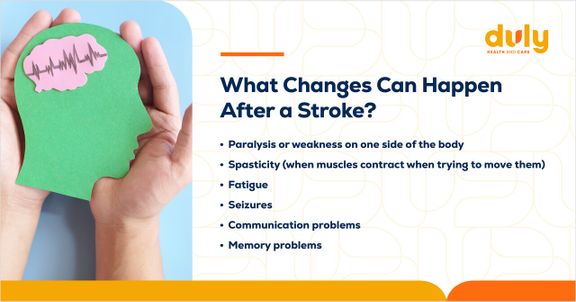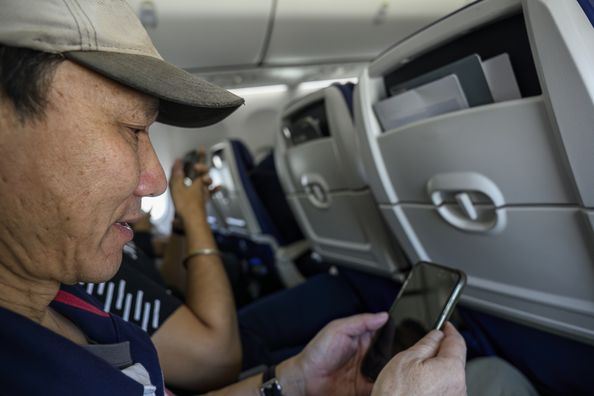Having a stroke is one of the most life-changing medical events you can experience. Because of the changes that occur both physically and cognitively, life after a stroke can be overwhelming.
The weeks and months following a stroke are important in allowing your body to recover. In those first few weeks, months, and even the full year following a stroke, you have the highest risk of having another one.

Even though stroke rehabilitation can help you build back your strength and your confidence, some activities may look different or be temporarily off-limits. Here are 3 common questions about life after stroke and the importance of taking care of yourself as you heal.
1. Can Stroke Patients Fly?
After a stroke, you may find yourself needing to travel by plane, which can be stressful for anyone. Air travel involves a lot of walking, moving from location to location, and being away from the comfort of your home. It also means putting distance between you and your healthcare provider.
While there’s no exact time period in which you should avoid traveling in an airplane after a stroke, you might need to wait before boarding your next flight. Talk to your healthcare provider, who can advise when air travel will be safest for you and what steps will make the process easier on your body.
You may also need to plan ahead to keep track of any medication you’re taking. Be sure to keep medications with you in your carry-on and bring enough for your entire trip.
On a long flight, you may be inactive for a long time, putting you at risk of a blood clot in a vein called deep vein thrombosis (DVT). To reduce risks related to DVT, stay hydrated and move around the cabin from time to time. You may also benefit from compression stockings, but you should talk to your healthcare provider before wearing them. For some people, they may reduce blood flow too much and cause other problems.
Do you have questions about stroke recovery? Talk to a Duly Neurologist, who will help you understand how to safely and effectively heal after a stroke.
Find Neurology Providers near you >
2. Can Stroke Patients Drive?
Driving offers a sense of freedom that can feel limited after a stroke. It allows you to rely less on others and go about your day as you please. However, there are safety concerns to consider when driving after a stroke.
After a stroke, you may experience:
- Weakness or paralysis on one side of the body
- Trouble thinking, speaking, or seeing clearly
- Difficulty controlling your body
- Forgetfulness and irritability
- Medication-related side effects, such as drowsiness
Still, with the green light from your healthcare provider, you may be able to resume driving safely. They might require a waiting period or suggest certain modifications to your car. To ensure you’re fit for the road, consider taking a driving test with a driver rehabilitation specialist or enrolling in a driver’s training program.
If you’re permanently unable to drive due to safety concerns, remember that there are plenty of options to get around, including public transportation (which may be free if you qualify), community organizations that offer low-cost or free transportation, and your own support system of loved ones.
3. Can Stroke Patients Exercise?
Physical activity is one of the best ways to support your body as it regains strength after a stroke. It helps you:
- Improve your balance, mobility, and ability to walk
- Improve your mood and reduce depression
- Lower your risk of another stroke
- Lower your risk of heart-related concerns, such as high blood pressure and obesity
Before starting any exercise, check with your healthcare provider, who will tell you when it’s safe to begin physical activity. You can also enroll in a stroke rehabilitation program to ensure you’re protecting your body and increasing physical activity in an appropriate way.
When it’s time to start exercising, start small – then gradually increase time and intensity as you build strength. You may also want to break up exercise into smaller increments, such as three-minute intervals.
After a stroke, you’ll benefit from:
- Stretching and flexibility exercise, such as yoga and tai chi
- Aerobic exercise, such as brisk walking or water aerobics
- Balance exercise, including strengthening your core muscles
- Strength-training exercise, including with weights and resistance bands
The Importance of Stroke Aftercare
A stroke takes a major toll on your body and mind. It affects a range of necessary functions, including strength, fine motor skills (small movements with the hands and feet), gross motor skills (large movements with the arms, legs, and torso), vision, speech, language, cognition, and emotions.
The first few months after a stroke are critical. Physically, you’ll need to regain strength and endurance to avoid injury and get back to your routine as safely as possible. Mentally, you’ll need to reform connections in your brain that help it do its job.
With the right support – including regular appointments with your healthcare provider and a stroke rehabilitation program – you’ll give yourself the best chance of a full recovery. At Duly Health and Care, your care team may consist of physicians, neurologists, physical and occupational therapists, nutritionists, social workers, and other experts of stroke aftercare. At home, lean on your family and friends, who can help you with day-to-day needs.
Life after a stroke may be different, especially at first. But with the right aftercare and dedication to recovery, you can get back to your normal routine as much as possible.
Health Topics:








